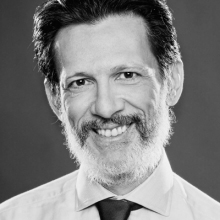Subscribe:
In the world of specialty drugs, marketing looks different than you might expect. Specialist doctors learn about new medications without consulting a brochure or sales representative. Instead, they inform themselves through scientific evidence very early in the drug’s development – long before it ever hits the market.
This is what Professor Demetrios Vakratsas, a marketing expert at the Desautels Faculty of Management at McGill University, discovered in a recent study. He found that specialist physicians use scientific evidence to stay current on pharmaceuticals’ latest specialty drug developments, before they’re ever put to market. This helps doctors prepare to use the medication as soon as it’s cleared for use with patients, all while removing the need for traditional marketing tactics.
“The scientific evidence is the trigger that ignites the whole social network,” said Vakratsas on the McGill Delve podcast. “Information can travel very fast about a specialty drug, and definitely before the drug hits the market.”
Specialty drugs are medications that are “novel, complex, and important,” said Vakratsas. They’re designed to treat rare conditions that don’t respond well to traditional therapies, and they’re very expensive to develop. In 2018, specialty drugs in the United States accounted for half of medicine net spending, even though they represented a fraction of the 5.8 billion prescriptions made that year.
Specialty drugs don’t have the mass-market potential of Tylenol or Advil because they’re made to treat very specific conditions. If pharmaceuticals are going to develop these niche medications, they need to make sure doctors want them. And doctors will only want them if they’re confident the drugs will meet the needs of their patients.
A different kind of marketing
Specialist doctors read medical journals, consult clinical guidelines, and attend conferences to learn about promising new medications. Some of these specialists are themselves involved in developing the drug, either by administering clinical trials or helping set the drug profile (i.e. the characteristics a drug should have). By the time the medication is approved for widespread use, specialists have all the information they need to start prescribing right away, said Vakratsas.
The specialists in Vakratsas’ study are participating in a kind of word-of-mouth marketing. They’re sharing information among each other to track the developments of promising new medications. And because specialist communities tend to be small, information travels quickly in these circles.
This happens in part thanks to clinical trials. Pharmaceuticals sponsor trials for their latest medications and recruit specialists to conduct studies with patients. From there, the doctors involved in the study can spread the word.
“It’s not the marketing we know,” said Vakratsas. “But it is an effort on behalf of pharmaceutical firms to inform the medical community of their developments.”
Instead of distributing brochures and placing ads in medical journals, pharmaceuticals market specialty drugs through the production of scientific evidence.
Does that mean marketers don’t have a role here? Not exactly.
“A lot can happen behind the scenes by gathering the input of physicians and patients and contributing to a better design of the profile of the drug,” said Vakratsas. “In other words, being the voice of the customer.”
Marketers can work with physicians to better understand their needs, the needs of their patients, and what they need the drug to do. In so doing, marketers can become participants in the drug development process. They can gather feedback that will inform the final form of the medication. This is good for pharmaceuticals who want to make sure their new drug will sell, and it’s good for doctors who want to ensure the new drug meets the needs of their patients.
This kind of collaboration between doctors and drug developers can raise some concerns. Pharmaceuticals are some of the biggest companies in the world. When they work with doctors, who decides what drugs are developed in the first place? And what does this collaboration mean for publicly funded health systems, where privatization is often seen as undesirable?
Professor Vakratsas explores these questions and more on the McGill Delve podcast. Listen here.

Demetrios Vakratsas
Article by Eric Dicaire.
This episode of the McGill Delve podcast was hosted and produced by Eric Dicaire, Assistant Editor at McGill Delve. Saku Mantere is McGill Delve’s Editor-in-Chief and he produced all the original music.
Based on the paper Scientific Evidence Production and Specialty Drug Diffusion by Demetrios Vakratsas and Wei-Lin Wang.













